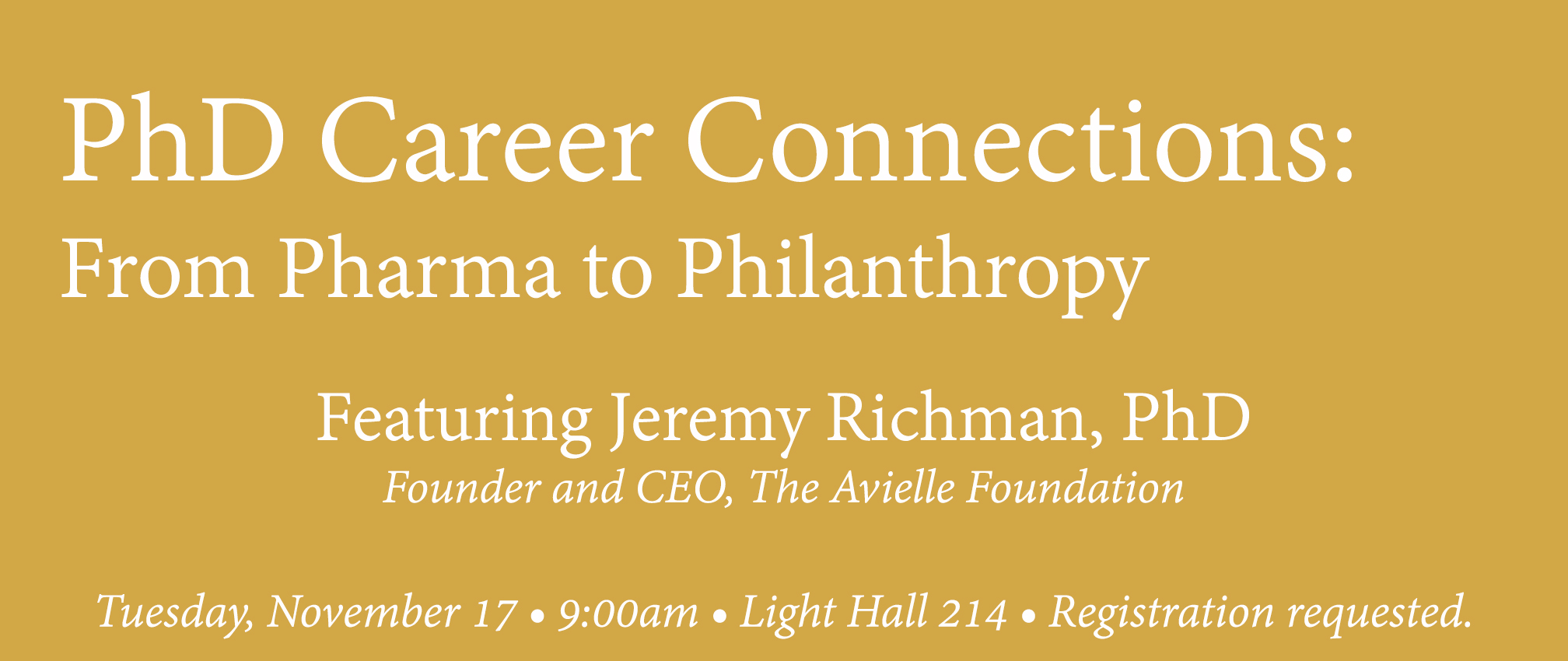PhD Career Connections: From Pharma to Philanthropy

PhD Career Connections presents:
From Pharma to Philanthropy
Tuesday, November 17
9:00am-10:00am
Light Hall 214
featuring Jeremy Richman, PhD
We are pleased to announce that Dr. Richman will also be delivering the Flexner Dean's Lecture Series Annual Felts Lecture. Please RSVP for that event also!
"Making the Invisibile Visible: Violence, Compassion, and the Brain"
Monday, November 16
208 Light Hall, 12:00-1:00pm
Dr. Jeremy Richman has extensive research experience that spans the range from neuroscience and neuropsychopharmacology, to cardiovascular biology, diabetes, obesity, metabolic syndrome, immunology and inflammation, and kidney disease. He has worked in the drug discovery arena for over two decades and is passionate about helping people live happier and healthier lives. His hobbies include rock climbing, mountain biking, kung fu, and teaching children how to be healthy and happy.
Dr. Richman earned his Bachelor of Science degree in molecular and cellular biology with an emphasis on chemistry and physics from the University of Arizona, Tucson, AZ in 1992. He worked as a laboratory technician for two years in the lab of Dr. Henry Yamamura, studying the pharmacology of pain modulation and molecular pathologies of Alzheimer’s disease. In 1994, Dr. Richman was accepted into the graduate program of Pharmacology and Toxicology at the University of Arizona where he earned a Ph.D. studying the distribution and functions of alpha2-adrenaline receptors in the laboratory of Dr. John Regan.
In January of 1998, Dr. Richman continued his research on the sympathetic nervous system in the laboratory of Dr. Lee Limbird at the Vanderbilt University Medical Center, Nashville, TN. Here, Dr. Richman focused on the sub-cellular distribution of the alpha2-adrenaline receptors as it pertained to micro-domain and synaptic formation. In January of 2001, Dr. Richman moved into drug discovery as a neuroscientist at Arena Pharmaceuticals, Inc, San Diego, CA with the hope of identifying therapeutic mechanisms to prevent schizophrenia, Alzheimer’s, and Parkinson’s disease. His drug discovery interests broadened over the next decade, leading projects in atherosclerosis and thrombosis, and eventually diabetes, metabolic syndrome, and obesity. In January of 2011, Dr. Richman took on a drug discovery leadership role at Boehringer Ingelheim in Danbury, CT exploring ways to prevent or cure a number of autoimmune and chronic diseases of the cardiovascular and metabolic systems.
Following the murder of his daughter, Avielle, Dr. Richman and his wife, Jennifer Hensel, started the Avielle Foundation. It is his belief that through brain health research and initiatives, we can protect our loved ones and foster happier and stronger communities.